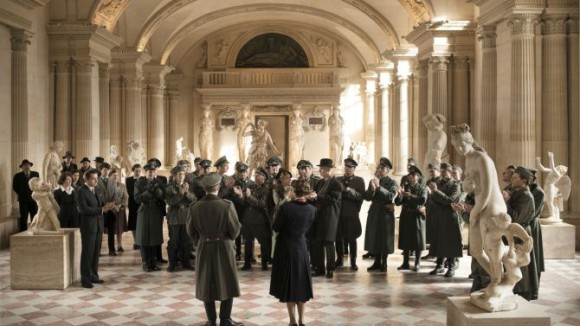
Like irritating mosquitoes on a hot summer afternoon, three fighter planes of the German Luftwaffe fly over a majestic and impregnable Louvre museum. This is the opening image of Francofonia, a documentary reflecting on art and the courage of men fighting to protect it against forces of destruction. A most appropriate and needed interlude at this particularly tense time for the humanity.
Although labeled a documentary, Francofonia – a Russian-German-French production – is part newsreels, part fiction, part poetic images. The film, directed by the well-known Alexander Sokurov, won an award at the September 2015 Venice Film Festival.
Count Wolff Metternich, a German officer of Prussian origin, walks down a vaulted hallway. He is there to meet Jacques Jaujard, the French director of the Louvre. The two men are stiff and on their respective guards. Metternich asks Jaujard, “Do you speak German?” “No,” responds Jaujard, “The answer is, I am very French.”

Ironically both men are on an identical mission. In 1939, most of the Louvre’s art work, including the “Victory of Samothrace” – the museum’s most illustrious treasure – was removed by the staff and hidden in the cellars of French castles. Metternich had done precisely the same thing with the collections of the Cologne cathedral before the start of the war.
With an element of pathos, Sokurov imagines the visit of German military to the Louvre. Did they realize it was an empty place except for Assyrian winged bulls and other monumental sculptures, which might have been left on purpose to act as the watchdogs of an idea?
Two iconic guides take us through the deserted Grande Gallery. A fat-bellied Napoleon, behaving like the host, points at the David’s painting of his coronation. “This is me,” he says proudly. But it is with irony that Sukurov shows “Napoleon crossing the Alps” by Delaroche as an undignified and tired man riding a mule rather than the dashing rider imagined by David. Our other guide, Marianne, wearing the distinctive Phrygian bonnet, repeats over and over “Liberté, égalité, fraternité.”
Sukorov accompanies us through an empty museum filled with the memory of treasures now gone. A hand touches the diaphanous finger tips of a statue; Clouet’s delicate portraits come alive; and so do Millet’s peasants, sitting by the fire, their deeply-lined faces showing their exhaustion. The greyish, almost sepia, quality of the photographs adds to the eerie feeling.
The camera moves in and out of the Louvre and depicts difficult scenes, which demand pause for thought. A tanker is struggling in the fury of the Baltic. Will the works of art it carries in its containers survive or be crushed by the waves? The frozen body of a well-dressed little girl lying on a street during the siege of Leningrad evokes the human suffering caused by war.
Francofonia is a complex film, which can be read on several levels. It came on the Paris screens not long after the blasting of Palmyra and other archaeological sites by Daesh (ISIS). The message is crystal clear — art, which is the legacy of our civilization, is too precious to die.
 About the author: Nicole Prévost Logan divides her time between Essex and Paris, spending summers in the former and winters in the latter. She writes a regular column for us from her Paris home where her topics will include politics, economy, social unrest — mostly in France — but also in other European countries. She also covers a variety of art exhibits and the performing arts in Europe. Logan is the author of ‘Forever on the Road: A Franco-American Family’s Thirty Years in the Foreign Service,’ an autobiography of her life as the wife of an overseas diplomat, who lived in 10 foreign countries on three continents. Her experiences during her foreign service life included being in Lebanon when civil war erupted, excavating a medieval city in Moscow and spending a week under house arrest in Guinea.
About the author: Nicole Prévost Logan divides her time between Essex and Paris, spending summers in the former and winters in the latter. She writes a regular column for us from her Paris home where her topics will include politics, economy, social unrest — mostly in France — but also in other European countries. She also covers a variety of art exhibits and the performing arts in Europe. Logan is the author of ‘Forever on the Road: A Franco-American Family’s Thirty Years in the Foreign Service,’ an autobiography of her life as the wife of an overseas diplomat, who lived in 10 foreign countries on three continents. Her experiences during her foreign service life included being in Lebanon when civil war erupted, excavating a medieval city in Moscow and spending a week under house arrest in Guinea.